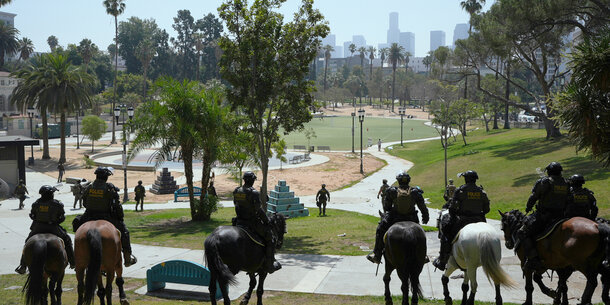The Department of Justice sued Los Angeles last week over the city’s so-called sanctuary laws, rules that preserve its right not to participate in the sweeping federal campaign to ramp up immigration enforcement.
Only weeks after federal immigration raids set off chaos in a small area of downtown LA, the federal government claims that the city’s policies, which prohibit police officers from affirmatively assisting in immigration enforcement, amount to active obstruction of federal law.
Last Monday’s challenge follows at least six other federal lawsuits against states and cities with sanctuary practices. Additional lawsuits seem likely, as the Department of Homeland Security has not let up on its rhetoric about local opposition to its policies and published a list of some 400 supposed sanctuaries that appears designed to guide federal efforts to browbeat cities into submission. Some local governments dispute their designations as “sanctuary jurisdictions.” DHS withdrew the list following local police agency opposition.
These lawsuits and other actions — such as threats to freeze federal funding from sanctuary cities or to prosecute their officials — clearly violate the 10th Amendment, which provides that powers not granted to the federal government are reserved to the states as independent sovereigns in our system of federalism. While states may choose to help enforce federal law, the U.S. government cannot “commandeer” their resources by demanding participation or by threatening to prosecute or withhold funds from states that opt out. The same goes for cities, which are legally considered subordinate parts of their states.
The lawsuits are an attempt to punish existing sanctuary jurisdictions and dissuade others from joining them. Sanctuary laws vary across cities and states, but they typically involve the jurisdiction withholding active assistance from federal immigration enforcement. These laws may prohibit the initial collection of immigration status information, limit the sharing of identity information with federal agencies, or direct jail personnel to decline requests to detain immigrants simply so immigration agents may pick them up.
No sanctuary laws authorize city or state officers to actively obstruct federal enforcement, and many have exceptions that allow sharing of information about certain serious crimes. Moreover, as experts across the ideological spectrum have noted, immigration sanctuary laws can promote safety, enhance community engagement with police, and foster economic development.
Despite this, President Trump issued an executive order in April undermining the sovereignty of state and local jurisdictions by attacking their efforts to retain control over their personnel and limit their involvement in immigration matters. The order declares that jurisdictions that do not actively help the government enforce immigration law are engaged in illegal obstruction and directs federal agencies to take “appropriate action” — a largely undefined term — to stop the enforcement of sanctuary laws. So far, that has involved bringing federal lawsuits seeking declarations that the practices are unlawful.
That order also directs the Departments of Justice and Homeland Security to notify named jurisdictions of their “defiance” of federal law and supposed “potential violations of Federal criminal law,” prompting DHS to publish the list of sanctuary jurisdictions.
Make no mistake, these notices will serve as thinly veiled threats of retribution. Indeed, the order authorizes the federal government to pursue “all necessary legal remedies and enforcement measures” to bring sanctuary cities to heel. Likely potential actions include the termination of federal funding, prosecution of local officials for alleged obstruction of federal law, and investigations of public benefits programs, such as food stamps, cash assistance, and health care.
Two recent Justice Department memos laid the foundation for these bigger actions. The memos paint state nonaction as “resistance, obstruction, or other non-compliance” with federal “commands,” despite the 10th Amendment’s prohibition on commandeering state resources. They further task federal personnel with investigating and prosecuting local officials for supposedly harboring or bringing undocumented immigrants into the United States or conspiring to do so. And to carry out the president’s directives, the attorney general has ordered that these jurisdictions be stripped of all DOJ funding, such as for programs to support victims of sexual assault or communities after mass violence.
Courts affirmed during Trump’s first term that such punitive measures are unlawful. In 2017, a federal judge ruled that withdrawing funding as a means of punishment was an unconstitutional attempt to commandeer state resources in violation of the 10th Amendment. This past April, the same judge entered the same initial ruling — writing “Here we are again” — in a case brought by San Francisco and other cities. The federal government has appealed. Several of the other active lawsuits throughout the country raise similar issues.
Following the executive branch’s lead, Congress is considering legislation to prohibit states from using their own funds to provide health care to undocumented immigrants. That bill would also likely violate the 10th Amendment by directing how a state may spend its own money.
The political rhetoric surrounding these actions is alarming, premised on retribution and overreach, and the federal government’s attempts to make states enforce its immigration law are an affront to the American system of federalism. The list of supposed sanctuary jurisdictions will only serve to expand these challenges. In the face of this attack, it is time for judges, Congress, and the public to affirm that cities and states are not obligated to commit their resources to enforcing federal law that they see as unjust and harmful to their residents’ safety and rights.





